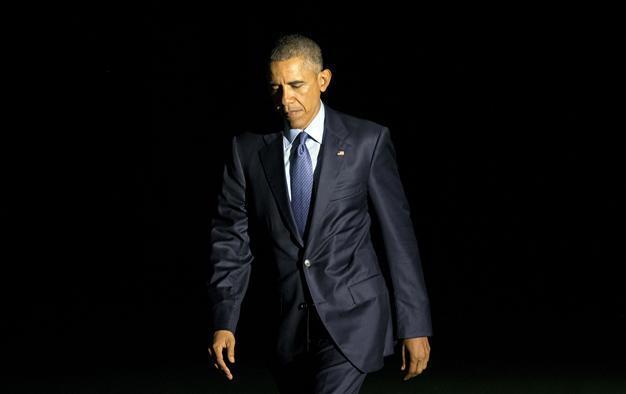Obama: echoes of Iraq war mindset in Iran nuke deal critics
PITTSBURGH, Pennsylvania - The Associated Press

AP photo
President Barack Obama denounced "chest-beating" critics and told a veterans group July 21 that those who oppose the diplomatic agreement to rein in Iran's nuclear program are some of the same people who were quick to want to go to war in Iraq and thought military action there would take only a matter of months."We're hearing the echoes of some of the same policies and mindsets that failed us in the past," Obama told the Veterans of Foreign Wars national convention in Pittsburgh. He argued that the Iran deal offers "a smarter, more responsible way to protect our national security."
Obama spoke one day after the U.N. Security Council unanimously endorsed the nuclear deal with Iran. The White House is mounting a massive outreach campaign to try to win over skeptics and avert a congressional attempt to scuttle the deal, dispatching top officials daily to television shows and Capitol Hill. Presidential press secretary Josh Earnest revealed that a major Internet-driven campaign for the Iranian agreement will soon get underway as well.
Obama told his audience there was "a lot of shaky information out there" about the deal, and he seemed eager to push back.
"The same politicians and pundits that are so quick to reject the possibility of a diplomatic solution to Iran's nuclear program are the same folks who were so quick to go to war in Iraq and said it would only take a few months," Obama said.
Obama's 2008 campaign for president centered largely around his opposition to the Iraq War, as he railed against the policies of President George W. Bush. By invoking the Iraq war in the context of the Iran deal, Obama offered a window into the parallels he sees in his efforts to use diplomacy with Iran to avoid getting the U.S. further embroiled in Mideast conflicts.
Yet even Obama has found that keeping the U.S. military out of conflict in Iraq and the violence-prone Mideast is easier said than done. Even as he seeks better relations with Iran, Obama is leading a coalition of countries engaged in a major campaign to rout the Islamic State of Iraq and the Levant (ISIL) group, which has exploited a vacuum of power in Iraq and Syria in the wake of the Iraq War and the ouster of Saddam Hussein. Last month, Obama ordered another 450 U.S. troops to Iraq to train Iraqi security forces, in another effort to reverse major advances by ISIL.
Obama said his administration had "done the hard and patient work of uniting the international community to meet a common threat. Instead of chest-beating that rejects the idea of talking to our adversaries, which sometimes sounds good in sound bites but accomplishes nothing, we're seeing that strong, principled diplomacy can give hope of actually resolving a problem peacefully, instead of rushing into another conflict."
From Pittsburgh, Obama was hopping a quick flight to New York to tape one of Jon Stewart's final episodes of the "The Daily Show," where the Iran deal was once again likely to be a key topic of conversation.
Obama also addressed the persisting problems at the Department of Veterans Affairs, which has been under intense scrutiny for more than a year over waitlists and other shortcomings in the VA health system. Last week, the VA said it is unable to count how many veterans died while waiting to sign up for health care, and said it may have to close some hospitals if Congress does not address a $2.5 billion shortfall.
The military community has also been on edge over the killing of four Marines and a sailor last week in Chattanooga, Tennessee. Obama has pledged a prompt and thorough investigation into an attack that authorities have blamed on a 24-year-old Kuwait-born man, and Obama said the U.S. was drawing strength from Chattanooga while sending an unmistakable message that the U.S. won't give in to fear or attempts to change the American way of life.
Obama's visit comes five years to the day after he signed the Dodd-Frank Act, the financial regulation overhaul that created the Consumer Financial Protection Board during the worst recession to hit the U.S. since the Great Depression. Republicans have continued to work to repeal major portions of the law, but Obama served notice that he will "not accept any effort to roll back this law."
















